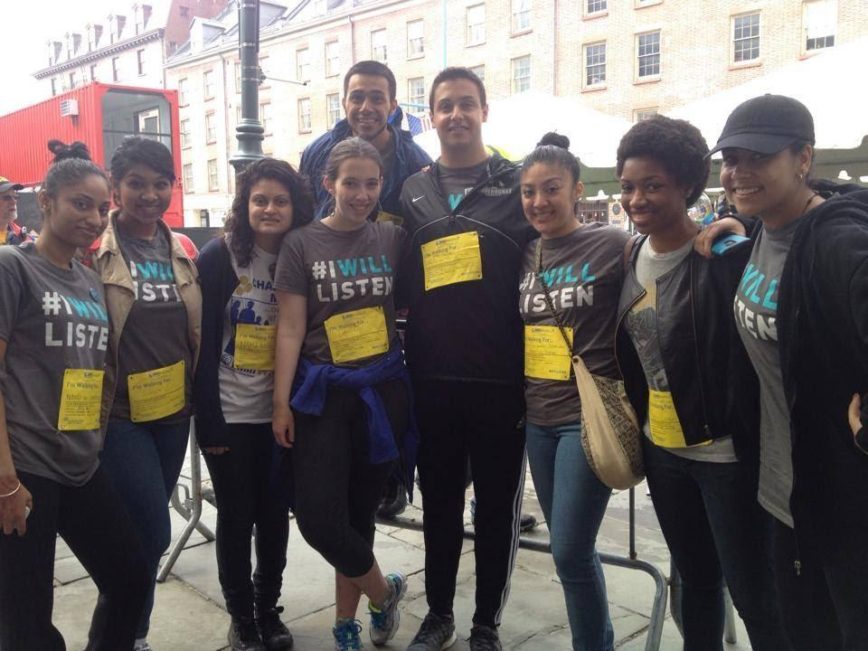What does it mean to become a “mental health advocate?” The words “mental health” and “advocacy” likely conjure up specific images and ideas for you, but I believe that there a few cornerstones that unite all mental health advocates, and several actionable steps that budding advocates can take.
My own journey into mental health advocacy began about five years ago. The seeds were first planted in Spring 2012 while I was training to be an Undergraduate Peer Counselor at my college. As part of this training experience, we coordinated and participated in campus outreach and education. Two key aspects of this outreach were promoting mental wellness among college students and helping to destigmatize mental health concerns. By learning the facts about mental health among college students and recognizing the need for more mental health awareness on campus, we were able to build off of prior Peer Counselors’ efforts to promote these causes, and I helped to eventually co-found a National Alliance on Mental Illness (NAMI) on Campus club with other Peer Counselors at my college.
In many ways, my initiation into mental health advocacy was the result of serendipity: I was simply majoring in psychology at the time, interested in pursuing a career within this field, and thankfully surrounded by like-minded people. While I wasn’t actively searching for an advocacy role, I naturally gravitated toward that role when the opportunity came up, and it felt like a good fit.
My subsequent connections to NAMI’s local, state and national levels strengthened this role and further connected me to other advocates, including Hakeem and his work. It was great to be surrounded by so many passionate people and to learn from leaders in the field. Since this introduction, I have been able to advocate for mental health through public speaking, conversations with peers, research, clinical work and volunteering with local organizations. I believe my initial introduction into advocacy also fostered the motivation for me to eventually pursue doctoral studies in clinical psychology and research on stigma, which has provided me with a platform to continue advocating.
Now that I reflect on both my experience as a mental health advocate and the current political climate we’re in (e.g., funding cuts, keeping mental health on the agenda), I think about the cornerstones of mental health advocacy and the advice that I would give to someone who is interested in promoting mental health and pursuing advocacy:
- Connect it to your values: Be explicit with yourself about your interests in advocacy. You’re probably at this blog because you have a longstanding interest in mental health already. What draws you to this type of advocacy? Is it a personal experience? Know a friend or family member who has gone through a mental health struggle? Is it a general sense of social justice or related to your faith/spirituality? For me, I can identify with adolescents and young adults who are forming their identities and may find transitions to new schools difficult. I understand what it is like to feel vulnerable, and I have several friends and family members who have been open about their mental health, too. Mental health advocacy connects to my broader passions and values of social justice, public mental health education and facilitating a high level of care for the patients I work with. Connecting advocacy to your personal values makes the work feel natural and worthwhile. This is a cornerstone for any advocate.
- Volunteer and get connected: Mental health advocacy is vast. Connecting to your values can provide initial direction for where to start. Organizations range from general advocacy (like NAMI) to more specific advocacy (like the Depression and Bipolar Support Alliance [DBSA]). Additionally, advocates come in all shapes and sizes. If you have the time, volunteer it (programming, suicide hotline, eating disorder hotline, etc.). If you have the money, donate and become a member. If not, help raise money for a cause such as NAMIWalks. Follow mental health leaders and politicians on social media and keep abreast of new research and public policy changes. Listen to persons with lived experience and get to know their perspectives; attend public talks and anti-stigma programming by these individuals. Volunteering and getting connected will give you a good sense of the mental health community and current objectives.
- Know the research and engage: As an advocate, you will be part of many mental health conversations – perhaps with family, friends, colleagues, professionals and even policymakers. Become knowledgeable about some of the basic research in this area. Some initial areas I would suggest are: when the onset of most mental health conditions is (A: adolescence – young adulthood), the prevalence of mental health conditions (A: about 1 in 5 adults in the US any given year), the rate of help-seeking behaviors (A: only about 20-40%), the human and financial cost of not treating mental illness (A: incalculable, and millions to billions), evidence-based anti-stigma practices (A: contact and education), and common mental health stereotypes (e.g., the relationship between mental illness and violence). It also doesn’t hurt to be aware of local mental health resources and how to connect someone to treatment. Having a base knowledge of mental health will help you better engage with the public, other advocates and policymakers (including writing letters and calling your elected representatives).
- Collaborate and integrate: As mental health advocates, we must not operate in a silo but rather find ways to integrate this cause into ongoing social movements (but listen, too… integrate when appropriate and relevant, so as not to override an organization’s mission). Everyone has mental health. However, not everyone has the same access to mental health care, or the same risk factors that may impact one’s mental health. When I helped run NAMI on Campus, we collaborated with juvenile justice initiatives (e.g., “raise the age”), researchers on health disparities and minority access to healthcare, a DREAMer student organization, and a human rights program. Mental health is intertwined within many movements and causes, and there are generally opportunities to start a conversation about it. Movements against racism, for example, are intrinsically related to mental health, since racial discrimination can affect mental health and advocates can face burnout (check this article out for more on this).
Last but not least, take care of yourself. Self-care and your own mental wellness are vital to being the best advocate you can be. Stay close to your mental health community and use your supports.




